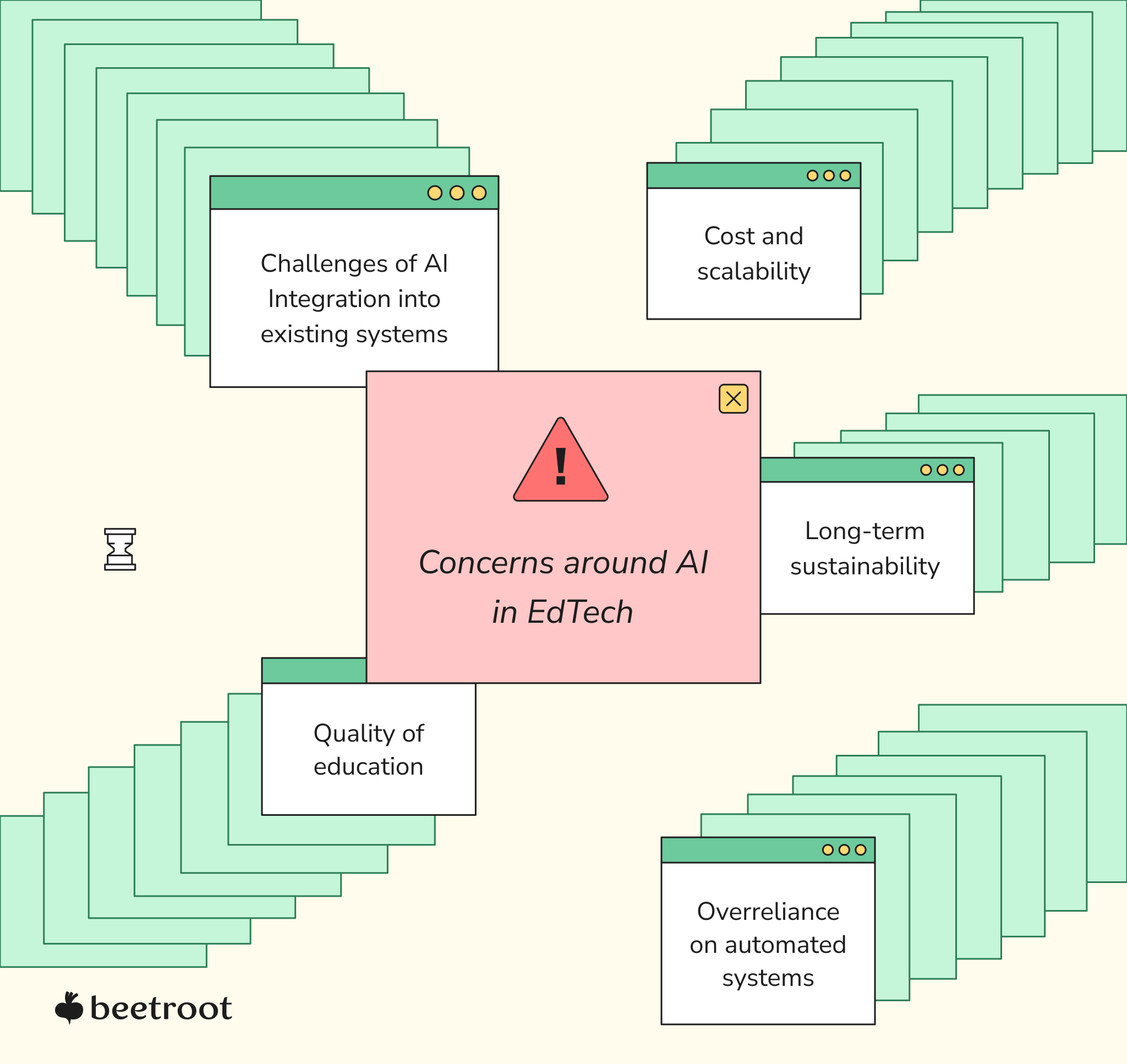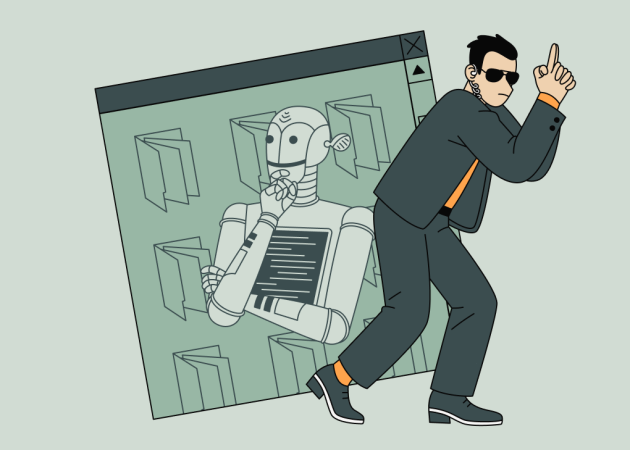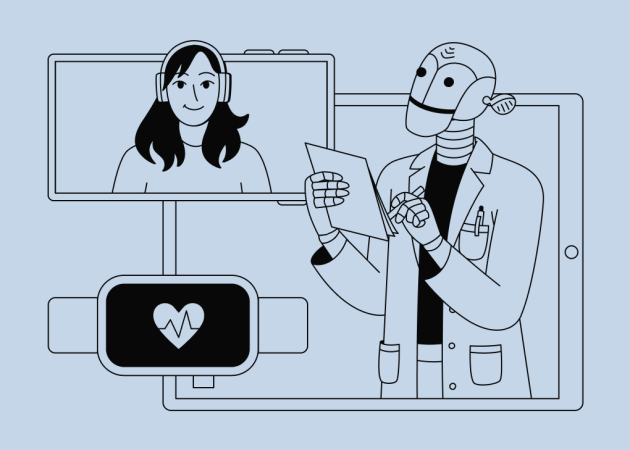Contents
Contents
For decades, the education process worldwide has stayed more or less the same without experiencing any transformative disruptions. Surely, students now make notes on their laptops instead of paper, do research on the internet instead of using physical books, and use interactive apps to be more engaged. However, fundamentally, the approach to teaching and learning has remained the same.
Now, however, as the rise of artificial intelligence penetrates almost every industry with a disruptive force, education is poised to change. A survey from Walton Family Foundation showed that within two months of ChatGPT launch, 51% of teachers reported using the tool. Moreover, most students (63%) and teachers (72%) agreed that ChatGPT was just another example of why we can’t keep doing things the old way for schools in the modern world.
The most recent AI survey by HEPI/Kortext (UK) showed an explosive use of generative AI tools among full-time undergraduate students, with almost 92% of respondents now using them in some form, compared with 66% in 2024. The main use cases for gen AI in assessments are explaining concepts (58%), summarizing relevant articles (48%), suggesting research ideas (41%), and structuring the student’s own thoughts (39%). The main reasons students use AI are to save time (51%) and improve the quality of their work (50%). The negative factors putting the students off using AI are possible cheating accusations (53% of respondents) and “hallucinations” or false results AI can produce (51%).
Artificial intelligence is already becoming a staple in the EdTech field: by 2032, the AI in education market size is predicted to reach $30 billion. The question is, how will AI affect education and those involved in the process? And even more importantly, how do we address the concerns and challenges that inevitably come with this technology?
As a software development company deeply engaged in the EdTech industry, Beetroot views studying and addressing the implications of AI use as a top priority. In this article, we will guide you through the key challenges and opportunities presented by AI, helping you to harness the transformative power of technology while mitigating its risks.

Quality of Education
AI is transforming teaching and learning methods from the elementary level to higher education and lifelong learning. For the youngest students, platforms like DreamBox use AI to adapt content based on children’s progress, ensuring they learn at their own pace. In higher education, adaptive learning systems like Knewton analyze student data to offer tailored course materials, improving retention rates. For lifelong learning, platforms such as Coursera employ AI to recommend courses and deliver personalized content, allowing adults to upskill and adapt to changing demands in the job market.
Personalization is considered to be one of the core benefits of AI in education. AI-powered educational tools can collect vast amounts of data on students’ interactions, progress, and preferences, later used to identify each student’s strengths, weaknesses, and learning styles. As a result, AI-enabled EdTech platforms can recommend specific learning materials, adapt the difficulty of assignments, suggest study schedules, provide instant feedback, and more, all based on individual needs.
Personalized experiences like these ensure that students receive the support they need and stay engaged in the learning process. From the big-picture perspective, all this helps make education more effective.
There is another significant, though much less noticeable, way students benefit from AI in EdTech. In 2020, the McKinsey survey showed that teachers worked about 50 hours a week, spending less than half of the time interacting with students. The same study claimed that technology could potentially help teachers redirect up to 30% of their time toward activities that support student learning.
As Vriti Saraf, CEO and founder of K20 Educators, told the World Economic Forum: “The less students need educators to be the main source of knowledge, the more educators can focus on developing the ability to curate, guide, critically assess learning, and help students gain skills that are so much more important than memorizing information.”
Quoting Derek Li Haoyang and Jason Towne from Squirrel AI Learning in 2025, “From adaptive learning platforms that personalize content for millions of students, to AI assistants that help teachers work more efficiently, the future of education isn’t about choosing between human teachers and AI, but rather harnessing the best of both worlds.”
AI tools like chatbots and virtual assistants can help educators streamline administrative and repetitive tasks like routine inquiries, assignment submissions, test grading, and lesson planning. By offloading this to AI, educators can focus on building deeper connections with their students, offering them personalized support and facilitating collaboration. As a result, the educational process might become more fulfilling for both students and educators.
Like with every new technology, there is a fly in the ointment. The use of AI comes with numerous challenges and concerns, including lack of human interaction, quality of AI-generated educational content, technology accessibility, and overreliance on AI, which we will get into later. One of the most complicated debates, though, is about the influence of personalized learning on the overall quality of education.
Personalized Learning vs. Standardized Curricula
The debate about personalized and standardized educational approaches arose long before AI came into the picture. However, since artificial intelligence fosters personalized learning, the discussion got even more heated.
With AI-driven EdTech tools and platforms, education becomes tailored to individual students’ needs, abilities, and learning styles. The high level of personalization allows students to progress at their own pace and receive immediate feedback. For example, adaptive learning systems can adjust the difficulty of assignments based on students’ performance, ensuring they are challenged but not overwhelmed.
The personalized approach AI offers enhances student engagement and fosters a deeper understanding of the subject matter, thus potentially elevating the quality of education. At the same time, some argue that standardized education ensures a consistent and fundamental knowledge base for all students, fostering equality and accountability. Moreover, the supporters of standardized learning view personalization as one of the disadvantages of AI in education and voice concerns about possible knowledge gaps it can lead to.
Luckily, AI doesn’t necessitate us to choose just one of these approaches. The technology can be used to offer personalized learning paths within the standardized curricula framework. For instance, an AI-enabled learning platform could provide personalized content for knowledge reinforcement once the students achieve the curriculum fundamentals.
To balance personalization and standardization, EdTech companies need to consider the nuances of the educational process, fine-tuning and adapting their AI systems accordingly.
Overreliance on Automated Systems and Other Artificial Intelligence Concerns
Just as AI-enabled automation can create more efficient educational experiences, it can also create shortcuts for academic tasks among students and lesson planning among educators. UNESCO surveyed over 450 schools and universities globally and reported that less than 10% of those have developed institutional policies or formal guidance regarding the use of generative AI (as of 2024). So, how does AI affect education when there are no guidelines on employing it properly?

Overreliance on such systems often leads to ethical artificial intelligence issues like cheating, which naturally results in failure to gain the skills necessary and an overall decline in education quality. After all, tools like ChatGPT aren’t designed to help students learn. They generate answers quickly without going deeper into the matter and explaining the reasoning behind those responses. In the long run, if misused, one of the most significant negative effects of artificial intelligence in education would be depriving students of developing fundamental critical thinking skills.
Moreover, while some rely too heavily on AI tools, others might not even have consistent access to computer devices and the internet, which creates equity issues, widening the gap between students from different backgrounds.
Even though we typically view AI in education as a way to personalize learning paths, misuse of the technology by educators can also result in a lack of personalized feedback and human collaboration. For instance, when educators rely too heavily on AI for tasks like grading and assessment, it can lead to a reduction of empathy that only a human teacher can offer. Furthermore, an overreliance on AI can hinder the interpersonal aspects of education that are crucial for holistic learning experiences.
To sum up, overreliance on artificial intelligence undermines the very purpose this technology aims to serve. Part of the solution here would be for educators, students, parents, and policy-makers to come together, admit the problem, and work on creating proper guidelines for the responsible use of AI applications.
However, EdTech companies can also join forces and commit to tackling this challenge. Specifically, they can create AI-powered tools that act as facilitators rather than replacements for educators. Through their platforms, EdTech companies can:
- encourage open-ended questions and discussions;
- encourage students to think critically and engage in collaborative learning experiences;
- emphasize the importance of human involvement in the learning process;
- provide guidelines for educators and students to use AI merely as a complementary tool without over-relying on it.
EdTech companies can begin by recognizing the vital role of human oversight within their own teams. Striking a balance between technical skills and emotional intelligence during AI product development ensures a more well-rounded approach to education technology. You can learn more about the matter in our article on building effective AI teams.
Cost and Scalability
When building impactful EdTech solutions, it’s important not to turn the project into a race since not all who implement AI functionality quickly win in the long run. Integration of artificial intelligence requires a mindful, calculated approach, and the executives in the field must understand the financial intricacies that come with it. Let’s look at the vital cost-related aspects of AI implementation.
Initial Investment
Developing and deploying custom AI solutions is an investment that requires a significant upfront cost. The process typically includes hiring AI professionals, developing or purchasing and training an AI model, and integrating it into existing infrastructure. For instance, in 2024, a language learning platform, Preply, raised $170 million in its latest investment round, primarily to enhance the development of AI-powered tutoring tools and enrich their learning materials.
Not all EdTech projects have to go that big, though. Besides, there are ways to reduce AI development costs, like outsourcing to companies with moderate rates, purchasing and customizing ready-to-use AI models, going with phased implementations, or leveraging government initiatives. However, the executives in the field still need to be aware of the initial investments such projects require.
Operational Costs
Beyond the initial investment, ongoing operational costs are a critical financial consideration. To stay relevant and efficient, AI systems demand consistent maintenance and updates. For instance, the tasks of professionals working with AI systems include fine-tuning algorithms, addressing data drift, monitoring model performance to adapt to maintain accuracy, and conducting regular security updates.
Sticking to these practices helps ensure the system effectively provides high-quality educational experiences. However, they also mean additional operational costs, not to mention expenses connected to data storage and third-party services that contribute to ongoing costs.
Scalability Challenges
Let’s say an AI-powered EdTech product hits the market and gets popular. As its user base grows, so do the computational resources and operational demands of the platform. And if the team doesn’t meet these requirements, the scale can simply outpace the capabilities of the platform’s infrastructure. In this case, the company needs to be ready for further investments in hardware and software, as well as additional AI professionals who can optimize the system and ensure seamless performance.
To cut a long story short, EdTech companies that aim to grow their AI solutions must also be prepared to make continuous investments to ensure their systems remain efficient and responsive.
Challenges of AI Integration into Existing Systems
In case an EdTech company already has a software platform, it makes perfect sense to enhance it with AI tools instead of building a new solution. But while this option is much more viable, it also might come with certain operational challenges. Let’s go over the most significant of them.

Data Compatibility and Accessibility
AI systems rely heavily on data to function properly. However, data is also often stored in different formats, databases, and platforms, which can potentially create compatibility silos. Therefore, the tech team must have the expertise and resources to ensure that AI systems can access and make sense of this diverse data. Otherwise, the AI’s potential to provide meaningful insights or personalized learning experiences might be limited.
The EdTech team’s task here involves:
- establishing robust data curation processes;
- enabling the collection and integration of diverse data sources;
- aggregating data in a standardized format;
- ensuring interoperability across various educational systems;
- implementing data accessibility protocols and securing proper storage and retrieval mechanisms.
Interoperability
Educational organizations frequently use a combination of software systems and tools for various purposes, including learning management systems, student information systems, assessment platforms, and more. Integrating AI across these diverse tools can be tricky due to interoperability issues since different systems may use incompatible protocols, data formats, or APIs, hindering seamless data exchange.
To ensure smooth integration of AI with other systems, EdTech teams can:
- adopt open standards and common data formats;
- establish robust APIs and middleware that can bridge the gap between systems;
- regularly test and validate the interoperability of AI systems with existing software to identify and resolve issues promptly.
Data Privacy and Security
With AI systems heavily relying on user data, ensuring data privacy and security is a major concern for EdTech executives adopting the technology. To ensure the data security of AI systems, tech teams need to:
- prioritize encryption;
- implement robust access control mechanisms like user authentication and authorization;
- continuously monitor AI systems for security vulnerabilities;
- conduct penetration testing and code review.
EdTech executives also need to foster a security awareness culture and provide training to employees and users.
Skillset and Expertise
All of the issues mentioned above are manageable with a skilled team of AI specialists. Depending on the platform’s specifics, these include data scientists, machine learning engineers, natural language processing (NLP) specialists, computer vision engineers, and more. Besides, an EdTech company can require experts with experience in education, such as AI in education ethicists.
Finding, hiring, and retaining these experts can be challenging due to the competitive job market. However, turning to a team that understands the specifics of the EdTech field and can effectively deal with AI-related challenges is a vital part of the product’s long-term success.
Long-term Sustainability
AI’s impact on education is transformative, but this transformation should be conducted with longstanding sustainability in mind, encompassing both environmental and operational aspects.
Environmental impact
The power of AI lies in its ability to analyze unbelievable amounts of data. This makes data centers the backbone of AI systems, and those require a lot of energy to maintain their servers. To be more specific, such data centers consume about 1,000 kWh per square meter, which is about ten times the power consumption of an average American home.
Currently, data centers are estimated to be responsible for about 1-1.5% of global electricity use, according to the International Energy Agency. This might not seem like much, but the number is steadily increasing, and EdTech executives need to explore sustainable data storage practices to mitigate the environmental footprint. For instance, a more eco-friendly approach might involve:
- investing in energy-efficient data centers;
- adopting renewable energy sources for data processing;
- optimizing data storage to minimize redundant information;
- implementing data lifecycle management strategies.

Operational sustainability
Another crucial aspect of the platform’s overall sustainability is its performance. AI models and systems require consistent updates and maintenance to stay relevant and effective. Otherwise, the EdTech company will have to deal with deteriorating performance and increased operational costs, not to mention reputational losses.
Let’s say your EdTech platform uses AI to make personalized recommendations on learning materials. If the model is not regularly updated, it might provide users with outdated information and refer them to obsolete resources. As a result, this will compromise the integrity of the platform and the quality of education it provides.
So, what can EdTech executives do to avoid these hazards and achieve operational sustainability? Some of the essential steps involve:
- establishing a robust maintenance, update, and security check schedule to ensure the AI systems remain sustainable and effective over time;
- regularly conducting staff training and engaging AI experts who can manage and optimize the systems;
- embracing interoperable standards and modular architecture to enhance scalability and flexibility.
Embracing the Responsibility
The impact of artificial intelligence on learning is hard to overestimate. Sundar Pichai, Google’s CEO, even calls AI “more profound than fire or electricity or anything we have done in the past.” However, with great power comes great responsibility.
As more and more projects start to leverage the advantages of AI in education, it’s crucial to admit and address the concerns and challenges that come with it together with educators, students, and policy-makers.
EdTech executives might not have the power to establish proper AI-use guidelines in schools or battle the problem of AI misuse. However, they do have an opportunity to eliminate other tech-related risks like data privacy breaches, algorithmic bias, and overreliance on their platforms.
The challenges we’ve discussed in this article may be overwhelming simply because artificial intelligence is a highly dynamic technology, and the demand for AI skills exceeds supply. However, as a software development company with expertise in both EdTech and AI, Beetroot can assure you that all of these concerns are manageable.
In case you need additional expertise to deal with AI-related challenges, our company offers services like dedicated EdTech teams, implementation of responsible data use practices, assistance in ML and data science, and more. Feel free to get in touch, and together, we’ll explore how Beetroot can help you build a sustainable AI-powered product that drives the industry forward.
Subscribe to blog updates
Get the best new articles in your inbox. Get the lastest content first.
Recent articles from our magazine
Contact Us
Find out how we can help extend your tech team for sustainable growth.







